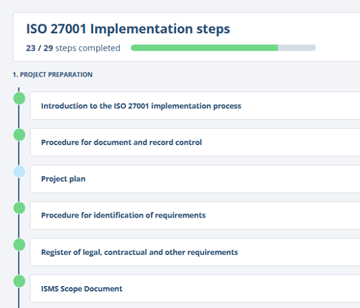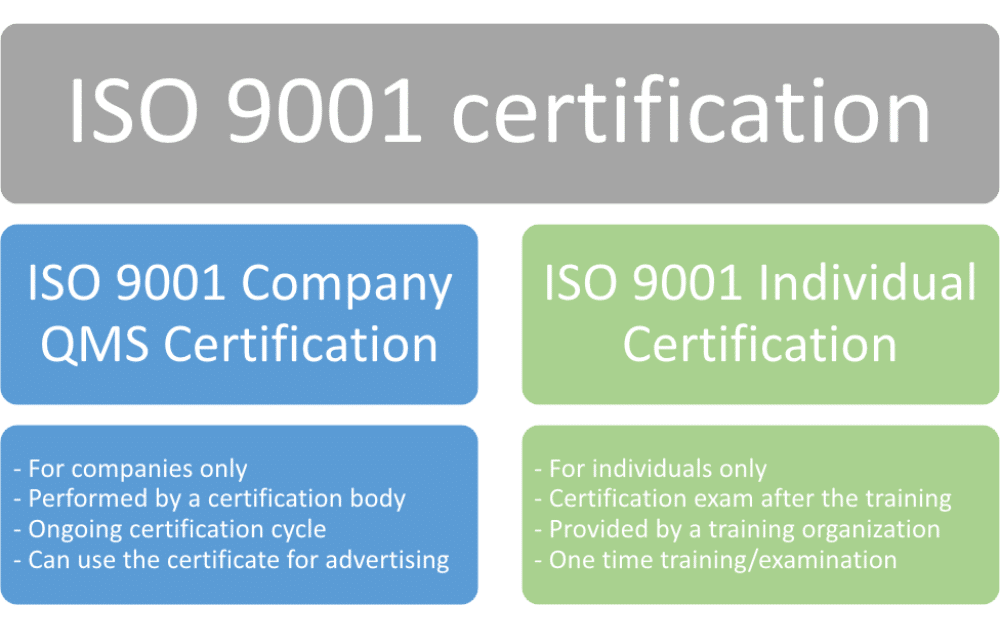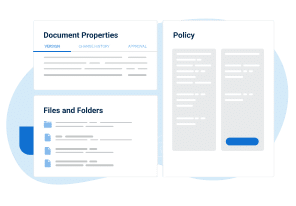How do you get an ISO certification? ISO 9001 company vs individual certification
When implementing a Quality Management System (QMS) using the ISO 9001:2015 international standard, the term ISO 9001 certification will come up a lot, but what does this mean? How do you get ISO 9001 certification?
ISO certification is used for both companies and individuals, but it has a different meaning for each. The certification process for a company involves implementing processes to meet all of the requirements in the ISO 9001:2015 standard, and then having an external certification body audit and confirm that all requirements are met. This includes a focus on customer satisfaction and meeting regulatory requirements.
For an individual, the certification process involves taking certain training courses, which usually includes passing a written test.
What is the meaning of ISO 9001 certification?
So, what is ISO 9001 certification? For a company, this means that they can advertise that external auditors have confirmed that they meet all of the requirements of the ISO 9001 standard and, therefore, their QMS meets these world-class requirements. ISO 9001:2015 has become the international standard for quality assurance in business organizations.
For individuals, an ISO 9001 certificate means that they have gained the knowledge required to implement or audit an ISO 9001:2015 QMS, and that they can apply this knowledge within the Quality Management System.
What are the requirements for ISO 9001 certification?
The certification process for companies starts with the decision to use ISO 9001 as the basis for the QMS. For an organization to be certified to ISO 9001:2015, the company must implement all of the processes required by the ISO 9001 standard using the process approach, and then demonstrate to the auditors of a certification body (sometimes called a registrar) that the requirements are met. This process is more detailed below. For individuals, ISO certification entails completing set ISO 9001 training, and to pass an exam included in that training.
What is QMS certification?
After implementing the ISO 9001 requirements, the company must maintain the Quality Management System for a length of time. During this time, company personnel must conduct internal audits and at least one management review of the system. After this, certified lead auditors from a certification body will assess the system against the requirements for ISO 9001. If the ISO 9001 certification company deems that the system meets the standard, and all of the ISO 9001 certification requirements are met, then an ISO 9001 certificate will be issued showing that the company’s QMS is acceptable to meet the standard. The company is then considered to be ISO 9001 certified.
What is a QMS audit?
A QMS audit is a planned and systematic review of the QMS processes that looks at what is actually done for each process as compared to the documentation and the requirements of the standard. The intent of the audit is to verify that the planned arrangements are actually being met; in other words, whether the company is actually performing its processes as they planned to do. In addition, the audit will look at the effectiveness and efficiency of the QMS.
What are the 3 types of audits?
The three types of audits are distinguished by who is asking for the audit, who is being audited, and who does the auditing. The first-party audit (also called an internal audit) is when a company hires auditors to audit its own processes. The second-party audit is when a customer hires an auditor(s) to audit its supplier. Finally, a third-party audit is when a company hires an independent external party to audit its processes against the ISO 9001 standard for the purposes of certifying that the Quality Management System processes meet the standard.
Can an individual be ISO 9001 certified?
An individual can be ISO 9001 certified, by attending an ISO 9001 training and passing the exam. ISO 9001 certifications for individuals are necessary to obtain the competencies and knowledge needed to use ISO 9001 for creating and maintaining a Quality Management System (often called a QMS) for a company. These individual certifications also allow the people involved to advance a career in Quality Management System auditing by proving their skills to potential employers.
How do I get QMS certified?
Individuals cannot become QMS certified, but they can be ISO 9001 certified. Individuals can do this by taking the appropriate ISO 9001 training and passing any applicable exam. There are many courses available, including two-day courses on how to implement ISO 9001, ISO 9001 Internal Auditor courses that are two to three days, and ISO 9001 Lead Auditor training, which is usually in a five-day format and includes a test. The Lead Auditor course can only be delivered by a company that itself has been accredited as being able to provide ISO 9001 Lead Auditor training. With the ISO 9001 Lead Auditor certificate, it is possible to be hired by a certification body to audit a company’s Quality Management System against the ISO 9001 standard.
How much does it cost to get ISO 9001 certification?
The ISO 9001 certification cost for an individual is quite simple – this is the price of the course as advertised by the training provider, plus the traveling costs if you do not attend an online course.
However, the cost of certification for a company can be hard to predict from the start. This is because each QMS must be tailored to the individual organization it is created for, so some companies will have more processes, or more complex processes, than others. Some of the main categories of cost that you will need to consider include learning about ISO 9001, external help, cost of employee time, certification costs, and finally, the costs to maintain your QMS.
For more on this, see the article: How much does the ISO 9001 implementation cost?
How long does it take to get ISO 9001 certification?
Like the cost of certification, the length of time to become certified can be difficult to tell for a company. If you have more documents to write and processes to develop, then it will take longer to make these changes. If you have more people working on the implementation, it will be faster than if you have fewer. One thing you will need to consider is that, after implementation, the certification body might want you to use your system for a certain length of time (e.g., three months) before they will come to perform the audit.
For individuals, the length of time to become certified is basically the time it takes you to complete the training course and test.
Who gives ISO certification?
ISO certification of companies is granted by certification bodies after they perform their certification audit. These ISO certification companies are accredited to perform these audits, and grant certification, by an accreditation body in a certain country. While it is possible to have a non-accredited certification body, your ISO 9001 certification will be more widely accepted if your certification body is accredited. For help choosing a certification body, see this free List of questions to ask an ISO 9001 certification body.
Likewise, ISO certification for individuals is granted by accredited training providers.
Why is ISO 9001 certification important?
ISO 9001 certification is important for a company because it allows them to demonstrate to their customers that they have the processes in place to provide products and services that meet their needs, as verified by an independent organization. Sometimes the ISO 9001 certificate is necessary to get a new client.
Likewise, certification of individuals demonstrates to employers, through an independent means, that the person has the skills and knowledge needed to implement and audit the ISO 9001 QMS. Certification is important to demonstrate to others your ability to use the ISO 9001 standard.
To learn more about the certification audit, download this free white paper: What to expect at the ISO certification audit: What the auditor can and cannot do. And, to learn more about the most popular ISO 9001 training courses, see this article: ISO 9001 Training.
Here is an overview of the 13 steps that are needed to help you make sure nothing is missed during ISO 9001 implementation, and here you can learn how to achieve organizational excellence with ISO 9001.


 Mark Hammar
Mark Hammar 





